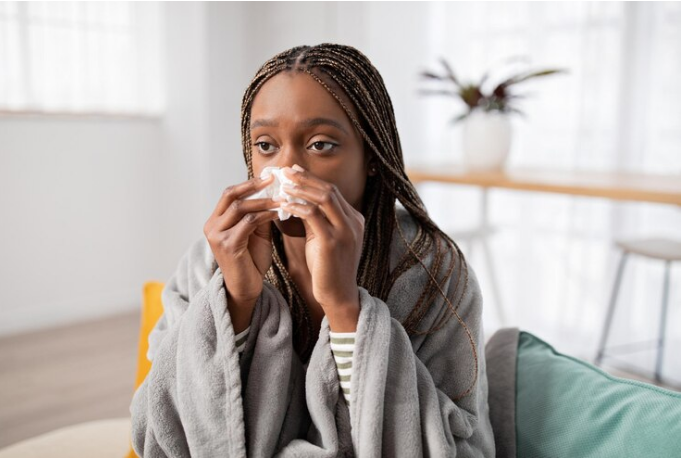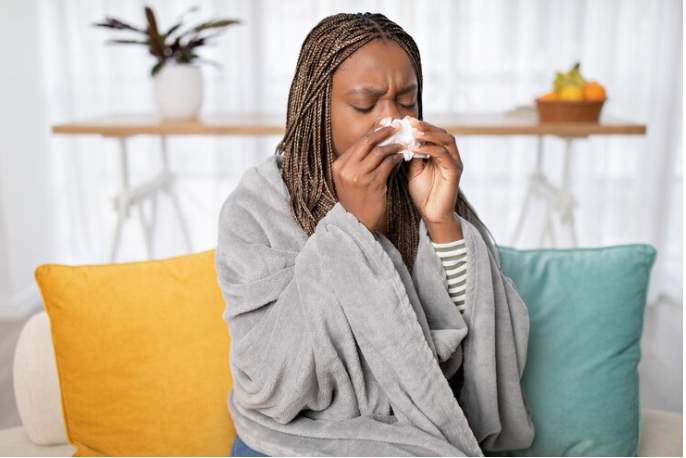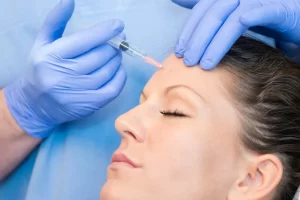

Introduction to Medicine for Runny Nose
A runny nose is caused by excess mucus production in your nasal passages. This leads to watery secretions that drip from your nose and sometimes also drip down the back of your throat.
A runny nose can occur with or without nasal congestion, also known as a stuffy nose. Nasal congestion is caused by inflammation of the lining of your nasal passages, which makes it harder to breathe through your nose.
There are a few reasons why you might have a runny nose. The most common is a viral infection of the sinuses — typically the common cold. In other cases, a runny nose may be due to cold weather, allergies, sinusitis, or other causes.
When you breathe in a virus or an allergen like dust or pollen, it irritates the lining of your nasal passages and sinuses. This causes your nose to start making clear mucus that traps the germs or allergens and helps flush these harmful substances out of your nose.
5 Home Remedial Medication for Runny Nose
On its own, a runny nose isn’t usually a cause for concern. If you don’t have any other symptoms, there are several ways to manage a runny nose at home with natural self-care options that don’t involve medication.
Let’s take a closer look at some of the home remedial medications for runny nose.
1. Eating Spicy Food
Spicy foods can make a runny nose worse. However, if you’re also having symptoms of nasal congestion, eating spicy foods may help.
If you can tolerate a bit of heat in your food, give it a try. If you’re unaccustomed to spiciness, try a small amount of spicy seasoning at first to see if it helps.
Hot spices like cayenne pepper, ghost pepper, habanero, wasabi, horseradish, or ginger are great options. These spices, while also creating a feeling of heat when eaten, dilate passageways in the body and can relieve sinus issues.
2. Stay Hydrated
When mucus is too thick, it can stick in your nose, aggravating nasal congestion. Drinking enough fluids loosens mucus, which helps drain your sinuses.
If you have a cold, you should aim for a minimum daily fluid intake of around 11.5 cups (for women) to 15.5 cups (for men). You may need to drink more if you’re experiencing fever, vomiting, or diarrhea.
3. Use Humidifiers
Humidifiers work by transforming water into vapor to moisten otherwise dry air. When you breathe in moisture, it helps to thin and dislodge mucus and soothe irritated sinuses.
If you decide to use a humidifier, it’s important to clean it regularly according to the manufacturer’s instructions. Otherwise, it can become a breeding ground for microorganisms such as mold and bacteria, which can exacerbate sinus problems.
4. Nasal Spray
Nasal sprays are a common OTC medication for runny nose. While medicated nasal sprays are available, saline nasal sprays are a natural treatment to help rinse the nose.
Much like nasal irrigation, they target nasal congestion and mucus using gentle salt water.
According to a research, people with upper respiratory infections makes use of a saline nasal spray to improve symptoms including a runny nose, nasal congestion, and sleep quality.
You can purchase a saline nasal spray at a neighborhood pharmacy or online.
5. Take a Hot Shower
Need some quick medication for runny nose? Try a hot shower. Just like humidifiers, a shower’s hot vapors can help alleviate a runny and stuffy nose.
Place your face and sinuses directly in the steam and spray of the shower for best results.
How To Treat Runny Nose Caused By Allergy
When a runny nose is caused by an allergy, the easiest way to clear it up is to avoid the allergen. For example, if you are allergic to ragweed, stay inside on days when ragweed pollen counts are high. Instead of opening your windows, use a fan or air conditioner to cool your home.
Keep in mind, however, that it’s not always possible to completely avoid allergens. If you’re allergic to pet dander, for instance, you might not be able to avoid all contact with pets. Still, limiting contact or removing yourself from the situation will typically relieve your symptoms.
Other common allergy treatments to clear up a runny nose caused by an allergy include the following OTC and prescription drugs:
- antihistamines
- nasal and/or oral corticosteroids
- nasal sprays
Antihistamines
Antihistamines are medicines often used to relieve symptoms of allergies, such as hay fever, hives, conjunctivitis and reactions to insect bites or stings.
They’re also sometimes used to prevent motion sickness, to treat feeling sick (nausea) or being sick and as a short-term treatment for insomnia.
Most antihistamines can be bought from pharmacies and shops, but some are only available on prescription.
If you have a severe allergy, your doctor might suggest other treatments based on your conditions to avoid exposing the patients to more risks and harm.
Types of Antihistamines
There are many types of antihistamine.
They’re usually divided into 2 main groups:
- antihistamines that make you feel sleepy – such as chlorphenamine (Piriton), cinnarizine, diphenhydramine, hydroxyzine and promethazine
- non-drowsy antihistamines that are less likely to make you feel sleepy – such as acrivastine, cetirizine, fexofenadine and loratadine
They also come in several different forms – including tablets, capsules, liquids, syrups, creams, lotions, gels, eyedrops and nasal sprays. All you just have to do is to pick the option of drug that best suit your state at that particular period and ensure you follow prescription as stated.
Corticosteroids
Commonly referred to as steroids, corticosteroids are a type of anti-inflammatory drug. They are typically used to treat rheumatologic diseases, like rheumatoid arthritis, lupus or vasculitis (inflammation of the blood vessels). Specific corticosteroids include the medications cortisone and prednisone.
Corticosteroids are man-made drugs that closely resemble cortisol, a hormone that your adrenal glands produce naturally. Corticosteroids are often referred to by the shortened term “steroids.” Corticosteroids are different from the male hormone-related steroid compounds that some athletes abuse.
How are Corticosteroids (Steroids) administered
Steroid medications are available in several forms that vary in how easily they dissolve or how long they stay in the body.
Steroids might be given locally, to the precise place where a problem exists, or systemically, which means throughout the “system” or body.
Examples of local steroid treatments include joint injections, eye drops, ear drops and skin creams. Systemic steroid treatments include oral medicines (given by mouth) or medicine that is delivered directly into a vein (intravenously or IV) or muscle (intramuscularly). Systemic steroids circulate through the bloodstream to various body sites.
When possible, local steroid treatments are prescribed instead of systemic steroids to reduce the risk of side effects.
Steroids is not a regular treatment that can be administered to a patient. It has to be a full prescription form a doctor who must have done total and thorough examination to ascertain the patient is far from risk
Nasal spray
Nasal sprays are used to deliver medications locally in the nasal cavities or systemically. They are used locally for conditions such as nasal congestion and allergic rhinitis. In some situations, the nasal delivery route is preferred for systemic therapy because it provides an agreeable alternative to injection or pills. Substances can be assimilated extremely quickly and directly through the nose. Many pharmaceutical drugs exist as nasal sprays for systemic administration (e.g. sedative-analgesics, treatments for migraine, osteoporosis and nausea). Other applications include hormone replacement therapy, treatment of Alzheimer’s disease and Parkinson’s disease. Nasal sprays are seen as a more efficient way of transporting drugs with potential use in crossing the blood–brain barrier.

How To Cope With A Runny Nose?
A runny nose is a sign of an immune system reaction. Your immune system is working, which could leave you feeling more tired than usual. Although you might not have other symptoms, you should still go easy on yourself.
To cope with a runny nose, try the following:
- Get lots of rest. Make sure your runny nose doesn’t get in the way of your sleep — take a shower before bed or use a humidifier in your bedroom.
- Stay hydrated. To prevent dehydration, make sure you’re taking in plenty of fluids.
- Blow your nose. Use a soft tissue to wipe or blow excess mucus from your nasal passages. Moisturize the skin around your nose to help prevent soreness.
- Wash your hands. Avoid spreading germs by frequently washing your hands with soap and water.
- Disinfect surfaces. Take a moment to wipe down surfaces and items that you touch regularly with a disinfectant.
- Stay home. Even if you don’t have other symptoms, it’s a good idea to stay home when you have a runny nose so you don’t get others sick.
My Name is Olunaike Omotoyosi Vivian, I’m a student chemist, currently studying Industrial Chemistry at Obafemi Awolowo University. I’m a blog writer, content writer, chemistry and health activist. I’do be using my writing skills to create health consciousness and awareness.






